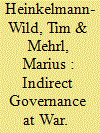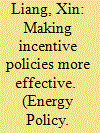|
|
|
Sort Order |
|
|
|
Items / Page
|
|
|
|
|
|
|
| Srl | Item |
| 1 |
ID:
183149


|
|
|
|
|
| Summary/Abstract |
Instead of attacking their adversaries directly, states often do so indirectly by supporting rebel groups. While these support relationships vary considerably, existing research lacks a comprehensive account thereof. To explain states’ choice of support, we suggest differentiating between two modes of support relationships according to the control opportunities they offer states over rebels: while delegation enables “hands-on” control, “hands-off” orchestration allows for plausible deniability and does not harm rebels’ local legitimacy. We argue that sponsors prefer orchestration when “hands-on” control can be substituted by goal alignment or competition; and they prefer delegation when the conflict is highly salient. Tests using global data for the period 1975-2009 support the first two expectations. Surprisingly, states’ capabilities also render “hands-off” orchestration more likely. The paper advances the understanding of external rebel support by transferring insights from indirect governance theory to the study of indirect wars and putting it to statistical test.
|
|
|
|
|
|
|
|
|
|
|
|
|
|
|
|
| 2 |
ID:
163549


|
|
|
|
|
| Summary/Abstract |
The building sector is responsible for a major share of energy consumption, with the most energy being consumed during the operation stage of buildings. Energy-efficiency retrofit (EER) policies have been promoted by numerous countries. However, the effectiveness of these incentive policies has been insufficient, a main reason being the agency problem between the government and building owners. In addition, most policies ignored the diversity of buildings and building owners, resulting in a lack of reaction from owners. To address this problem, this study proposed an agent-based model for policy making on EER. The model defined the government and owners as agents and their decision-making behaviors were modeled with principal-agent theory. A platform based on the proposed model was then developed and the incentive policy was optimized under different circumstances. To verify the effectiveness of the proposed model, three policy scenarios were compared on the platform, which are the policy by the proposed model, the incentive policy in Shanghai and Shenzhen, China. The results showed that the incentive policy based on the proposed model has the best performance on energy savings, returns on investment, and leverage effects. A sensitivity analysis indicated that the government should pay more attention to energy price.
|
|
|
|
|
|
|
|
|
|
|
|
|
|
|
|
| 3 |
ID:
178504


|
|
|
|
|
| Summary/Abstract |
Military assistance is a perennial feature of international relations. Such programmes typically aim to improve the effectiveness of local partners, exporting the donor's way of war through the provision of training and equipment. By remaking indigenous armies in their own image, donors likewise hope to mitigate the profound agency costs associated with the transfer of military capability. But, while technical and organisational transformations can provide notable battlefield advantages, the philosophies underlying such innovations are not so easily propagated. Instead, new tactics, structures, and technologies typically intersect with pre-existing local schemata of war, producing novel if sometimes dysfunctional hybrid praxes. According to principal-agent theory, the application of greater conditionality in the provision of military assistance should improve the fidelity of military diffusion, aligning agents’ divergent interests with their principals’ goals. In practice, however, principal-agent exchanges rarely exist in isolation. Examining the modernisation of nineteenth-century Japan as a case study in military diffusion, this article argues that competition between rival patrons allows recipient states to play would-be principals off against each other, bypassing conditionality by replicating a marketplace for military assistance. In so doing, however, agents trade functionality for sovereignty in their military diffusion.
|
|
|
|
|
|
|
|
|
|
|
|
|
|
|
|
|
|
|
|
|